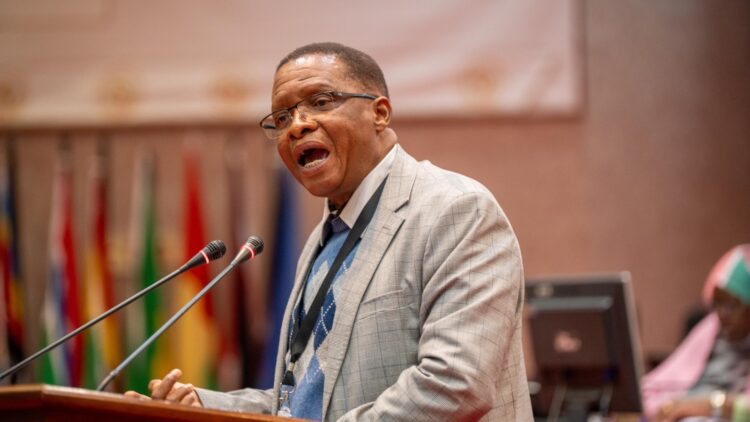By Byron Adonis Mutingwende
Originally posted on spiked media
MIDRAND, SOUTH AFRICA | 28 July 2025 (IDN) — In compelling presentations delivered today during a preparatory meeting of the 11th P20 Parliamentary Speakers’ Summit at the Pan-African Parliament in Midrand, South Africa, a strong case was made for advancing trade justice and improving global market access for African agricultural products.
In an address to parliamentarians during the symposium, Hon. Bhekizizwe Abram Radebe, the Chairperson of International Relations of the National Council of Provinces in the Parliament of South Africa, said agriculture employs over 70% of the continent’s workforce, with smallholder farmers comprising the bulk of this sector. For millions of Africans, he said, agriculture is not just a way of life—it is the foundation of survival, prosperity, and dignity.
Yet, the sector faces immense challenges, including:
– Limited access to finance;
– Inadequate market access;
– Climate change impacts; and
– Restrictive global trade policies.
“Despite vast natural resources—abundant rain, fertile land, and sunshine—Africa remains a net importer of food. This paradox reflects structural limitations rather than potential. It is our collective duty to address these barriers and unlock the full potential of African agriculture,” Hon Radebe said.
Key Challenges Undermining African Agricultural Trade
Addressing the same gathering, Hon Senator John Bideri, the Chairperson of the Committee on Trade, Customs, and Immigration matters of the Pan African Parliament (PAP), alluded to several challenges affecting African agricultural trade.
1. Tariffs and Non-Tariff Barriers
“African exports to global markets are often burdened with high tariffs, which diminish competitiveness. While developed countries enjoy subsidized agriculture, our smallholder farmers are left to compete on an uneven playing field,” he said.
2. Sanitary and Phytosanitary (SPS) Measures
Strict health and safety regulations—though important—are frequently used as trade barriers. For example, citrus exports from South Africa to the EU must undergo lengthy and costly quarantine processes, placing unfair burdens on African producers.
3. Carbon Border Adjustment Mechanisms (CBAMs)
Environmental policies, such as the EU’s carbon adjustment mechanisms, risk stifling African exports. These regulations often ignore the socioeconomic realities of developing nations and threaten jobs across entire value chains, like the proposed shift to tank shipping for South African wine, which could dismantle local bottling industries.
4. Subsidies in Developed Economies
Agricultural subsidies in developed countries distort global prices, making it impossible for unsubsidized African producers to compete. These subsidies include input support and price guarantees that lower production costs, artificially boosting competitiveness.
The Role of Parliamentarians in Driving Change
The two speakers said Parliamentarians have a critical role to play. They urged legislators to:
– Approve national budgets that prioritize agricultural support and infrastructure development;
– Push for financial support and access to markets for smallholder farmers;
– Hold executives accountable for implementing agreed-upon trade and climate policies; and
– Engage with international counterparts in the U.S., EU, and the U.K. to advocate fairer trade terms
“Let us recall how parliamentarians once shifted the tide against apartheid despite executive resistance. That same spirit must now guide our fight for fair agricultural trade,” Hon Radebe said
Climate Justice and International Support
“Africa is the least responsible for climate change, yet it bears the heaviest burden. The continent needs international support, not punishment. The promises made under the Paris Agreement must be honoured. Our farmers must be equipped with climate-resilient infrastructure and technologies,” he added.
Reviving and Reinforcing AGOA
The African Growth and Opportunity Act (AGOA) once provided critical duty-free access to U.S. markets. But today, with the rise of new tariffs, its impact is waning. The presenters urged African parliamentarians to engage with the U.S. Congress to preserve and expand AGOA, ensuring African goods can continue to access the world’s largest economy on fair terms.
Promoting Intra-African Agricultural Trade
Shockingly, intra-African trade in agriculture accounts for only 1% of the continent’s total trade. Colonial-era infrastructure was designed to export raw materials to Europe, not to connect African economies. The presenters said such legacy must be dismantled.
As a result, Parliamentarians must:
– Promote regional agricultural value chains;
– Invest in cross-border infrastructure;
– Harmonize SPS standards to allow seamless intra-African trade; and
– Leverage the African Continental Free Trade Area (AfCFTA) as a unifying framework for change.
They added that Africa should not export raw timber only to import finished furniture.
“We should process cocoa, timber, and maize here—adding value, creating jobs, and retaining wealth,” Hon Radebe said.
A Call to Collective Action
He added that South Africa’s presidency of the G20 is not just symbolic—it is strategic.
“Our input here should shape South Africa’s agenda at the G20, representing the aspirations of the entire continent. As the former President Mbeki emphasized, Africa must stand on its own. And as we say: even in the jungle, lions do not hunt alone—they hunt as a pack. Let us hunt together. Let us speak with one voice. Let us act with urgency.”
Conclusion: Restoring Dignity Through Agriculture
“A continent that cannot feed itself cannot claim dignity. But Africa has the tools, talent, and tenacity to change its fate. By addressing trade barriers, improving market access, and investing in smallholder farmers, we can transform African agriculture from subsistence to sustainability, from survival to sovereignty.
“Let us engage, advocate, and legislate—because Africa deserves a fair share in the global agricultural economy,” Hon Radebe added. [IDN-InDepthNews]

